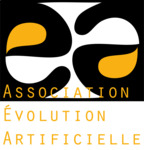 | EA 2026: 17th Biennal International Conference on Artificial Evolution Nice, France, October 27-29, 2026 |
| Conference website | https://ea2026.inria.fr/ |
| Submission link | https://easychair.org/conferences/?conf=ea2026 |
| Poster | download |
| Submission deadline | June 12, 2026 |
| Notification of acceptance | July 24, 2026 |
| Submission of camera-ready | September 11, 2026 |
| Author's mandatory registration | September 15, 2026 |
Authors are invited to submit original papers in the field of evolutionary computation (broadly considered) for presentation at EA2026 in Nice, France with potential publication in Springer LNCS. Submissions must not exceed 14 pages and be formatted in the LNCS style.
Overview
The biennial International Conference on Artificial Evolution (EA 2026) will celebrate its 17th edition in October 2026 on the French Riviera in Nice (France), a region well known for its famous Promenade des Anglais ("Walkway of the English"), the Festival de Cannes (32 km), the Monaco F1 Grand Prix (20 km), and the world perfume capital Grasse (40 km)...
The EA 2026 conference will continue the tradition gradually established during its previous editions by paying particular attention to:
- Quality: Rigorously selected by a high-level international programme committee, the selected papers (maximum 14 pages, Springer LNCS style) will be published by Springer, as in previous editions (https://link.springer.com/conference/ae).
- Depth: The single session format of 30-minutes presentations allows for a fruitful exchange between authors and participants.
- Best value: As a not-for-profit conference, only minimal conference fees are required to cover conference facilities, proceedings, lunches, coffee breaks, a social event and the banquet dinner.
EA is a non-profit conference dedicated to optimisation techniques that simulate natural evolution. Researchers involved in Artificial Evolution are interested in the mechanisms of living organisms, such as the mechanism of natural selection of species or the organization of animal societies (ant colonies, bird flights, schools of fish...), and use the latest technical and theoretical tools to extract new knowledge or new problem-solving methods. Mathematics and computer science are obviously well represented in this field, whose scope of application is large: from theoretical or applied problem-solving in combinatorics, game theory, economics, operations research, decision support and machine learning. Many complex industrial problems are currently being tackled and treated using this type of approach, for example, optimizing flood mitigation measures, improving transportation flow or the modeling of gene regulation networks in bioinformatics... This year, we would like to focus on combining metaheuristics and reinforcement learning, but contributions on other topics are also welcome.
Topics of Interest
Authors are invited to submit original papers on, but not limited to, the following topics:
- Theorical Studies as Convergence studies, Fitness Landscape analysis...
- Applications of evolutionary paradigms to the real world (life sciences, industry, socio-economic sciences, music, etc.)
- Evolutionary robotics, education, visualisation, interactive design and artistic applications
- Benchmarks & Comparison Methodologies
- Parameter Adaptation and Tuning
- Large-scale global optimisation
- Memetic algorithms, interactive optimisation, neural networks, etc.
- Ensemble Methods & Hyper-heuristics
- Distributed evolutionary paradigms
- Surrogate model assisted optimisation
- Topologies evolution operators
- Multi- or Many-modal optimisation
- Multi- or Many-objective optimisation
- Dynamic & Stochastic optimisation
- Hybridisation with other soft computing techniques such as machine learning, deep learning, reinforcement learning or fuzzy logic
Submissions and Attendance
Submissions must be original and not under consideration elsewhere. Papers (less than 14 pages) must follow LNCS conference format: https://www.springer.com/gp/computer-science/lncs/conference-proceedings-guidelines
All accepted papers will be published in the conference proceedings, which will be available shortly before the conference.
A selection of the best oral papers will be published in a volume of the LNCS series of Springer-Verlag (as in previous editions https://link.springer.com/conference/ae).
At least one author must register and present the paper at the conference. Authors of accepted papers are strongly encouraged to attend the conference in person to promote interaction, questions, and discussion among participants. Remote presentations will only be permitted under exceptional circumstances.
Committees
Chair:
- Denis Pallez, Université Côte d'Azur
Steering Committee:
- Lhassane Idoumghar, Université de Haute-Alsace
- Edward Keedwell, University of Exeter, UK
- Arnaud Liefooghe, Université du Littoral Côte d’Opale
- Evelyne Lutton, INRAE
- Nicolas Monmarché, Université de Tours
- Denis Pallez, Université Côte d'Azur
Organizing Committee:
- Lhassane Idoumghar (Treasury), Université de Haute-Alsace
- Pierrick Legrand (LNCS Publication, Booklet), Université de Bordeaux
- Julien Lepagnot (Submissions), Université de Haute-Alsace
- Nicolas Monmarché (CFP), Université de Tours
- Laurent Deroussi (Sponsors), Université Clermont-Auvergne
- Christelle Caillouet (Sponsors), Université Côte d'Azur
- Patrick Siarry (Publicity), Université Paris-Est Créteil
- Edward Keedwell (Best student presentation), University of Exeter
- Gaetan Rey (Web site), Université Côte d'Azur
- Cathy Escazut (local organisation), Université Côte d'Azur
